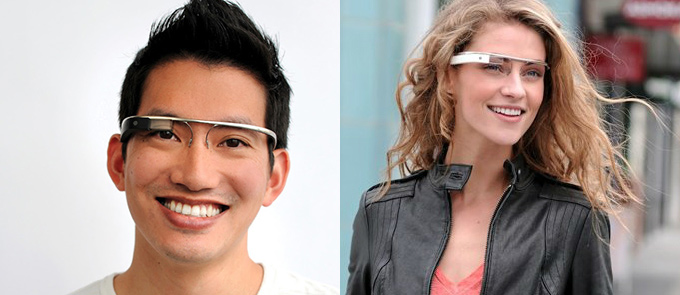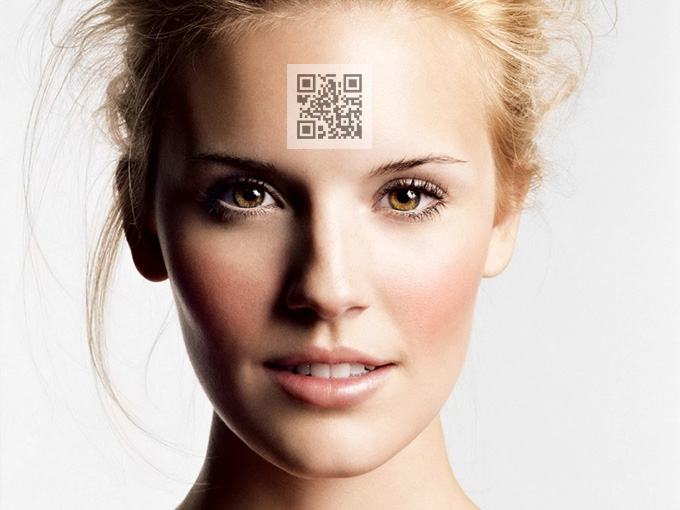Will Google Glass Lead to DBZ?
How would you feel if you were judged through the lens of a Scouter? What are the ramifications of a society reliant on Scouter technology? DBZ reveals it all.
Imagine a world in which you look at a person and see everything about them: their name, age, occupation, address, yearly income, and all other personal information. How would that affect your view of the person? How would that affect society?
Such a view may not be far off.
With the invention of Google Glass and similar products, paradigms are about to shift, and simply by wearing these glasses you’ll be able to look at businesses and locations in a whole new light. Geo synchronous maps, instantaneous wireless communication to anyone in the world, and boundless other possibilities will all be displayed on the tiny monitor in front of your eye.
For example, if you look at a QR code while wearing Google Glass, you’ll be able to see the same thing your smart phone currently sees, whether that’s a menu listing or an advertisement. Now imagine if that QR code was being worn by a person. What would it display? And how would this affect your view of that person?
Would that seem like a world changing invention? Absolutely, as everything they view would now be filtered, or valued, based on the data that is presented. If there’s no data or the value of the data is unpleasant, than that person’s value will appear diminished or outright negated.
This will lead to a shift in worldview for everyone who starts to see “the world behind the glass,” to coin a new phrase. Human beings are visual creatures and everything they perceive through this glass filter will be altered, or as the inventors call it, “augmented” before it reaches the regular lens of their eye. The gradual change in perception will lead to a shift in expectations for visual experiences to be augmented, and for that data to be informative or pleasant. This ultimately will lead to a profound change in societal norms and the perception and acceptance (or dismissal) of other humans based on the data presented.
Here is a sample video of the interface in action, placed in front of a video camera.
http://youtu.be/gn9qfuHZiCM
The introduction of this technology will at first be welcomed for all of its unique novelties. But in time it will become so commonplace that to not view the world around us (other people included) through the lens of this device will seem as antiquated and strange as the idea of not having your own cell phone appears today.
QR codes are already being used in China on ticket stubs for mass transit and similar practices are being implemented in the United States. QR codes are also being added to clothing in wrist straps and jackets. It’s not far fetched to imagine them being worn directly on our skin, tattooed or even embedded partially underneath through surgery.
Projecting further ahead, there may eventually come an age when QR codes are unnecessary and the data can be scanned simply by viewing the person’s skin, retina, or perhaps through infrared or other spectrum DNA analysis.
But here’s the most shocking part. This idea is nothing new. It appeared in the most popular and financially successful anime and manga of all time, called Dragon Ball Z, in 1989.
The Dragon Ball Z Scouter
In Dragon Ball Z there are characters called Saiyans who wear a device on their heads known as the Scouter. Scouters look and function in pretty much the exact same way as Google Glass. You look at a person, scan them, and the data about that person is presented to the wearer. The Scouter also has video and audio recording capabilities just like Google Glass, plus interstellar communication, surpassing Google’s measly terrestrial limits.
The Saiyans are a warrior race in outer space, and they land on different planets, use the Scouter to detect life forms and gauge their “power level” (a numerical value of their fighting ability), along with other vital statistics and anatomical structure. Then they get to work cleansing the planet of all life. Typical alien fare.
The sociological problem is that Saiyans weren’t born with this technology. It was given to them by a more technologically advanced alien race, and over time the Saiyans became reliant on this Scouter technology to the point where it permanently altered their worldview, of their own self-worth, and the worth of others.
This caused an obvious conflict when they arrived on earth and fought against Goku, the famous hero of Dragon Ball Z. Goku was raised with traditional East Asian values: to believe in the inherent potential of all people, to trust, have patience, and believe that people are not a fixed number. He rarely used technology and stood in direct opposition to the Saiyans’ belief (determined by the Scouter) that he was worthless and had no value. Goku saw things directly with his own inner eye, not the eye behind the lens.
The Saiyans were shocked to find out that Goku, despite what the Scouter said, had incredible fighting ability and was strong enough to defeat them. Their technology was wrong, and it cost them dearly.
Later in the series it’s also portrayed that technologically advanced artificial humans (i.e. androids) are able to scan human beings with internal scouter-like devices and pull up all the subjects personal information from a central repository, just as described above. The artificial humans don’t need an external device because it’s pre-installed into their lenses, and as Google Glass technology advances it’s not that far-fetched to imagine we will install this device on a contact lens or in the human eye (or brain), connecting directly to the optic nerve.
The ramifications of a reliance on external technology are discussed further in my new book, Dragon Ball Z “It’s Over 9,000!” When Worldviews Collide, available now on Amazon and iTunes.
For example, here is an excerpt from the section titled, “Human Nature in Action.”
What does this tell us about the nature of this alien society? In a world where everyone has a Scouter in front of their eyes, everyone else will look like a number. That simple number allows them to quickly categorize others and treat them accordingly. What is a person if not that number? They’re a complicated mix of contradictions, truths and lies, strengths and weaknesses, loves and hates, and an endless supply of emotions. They’re people!
Even Goku’s father cared nothing for his son. In Dragon Ball Z: Bardock, The Father of Goku TV Special (1990), his squad mates ask Bardock if he would like to go back to Planet Vegeta and visit his newborn child. Bardock says “To see the lowest-class warrior without any promise at all? What kind of fool would make that trip?” This is what the Scouter does, it strips people of their worth and turns them into a number. A society built upon these numbers denies its own humanity. How fitting that in Dragon Ball this society consists of aliens and mutants. There is no “human” among them.
It also tells us that if we only pay attention to that which is measurable through external instruments, then we’ll become blind to the wonders of potential and possibility in all that isn’t. In life, what you see matters much less than how you see it. Worldviews change the reality of what one perceives and responds to. Conflicts arise when worldviews collide and one person isn’t able to let go of their notions or expectations built up by the perceptions they created over time. For example, Vegeta uses the Scouter’s numbers to validate his own self-worth and invalidate others. He thinks of himself as the greatest and everyone else as worthless trash, including those who are more powerful, because his father taught him that he is a superior being and the Scouter repeatedly validated this belief. Are they really trash, or is that label due to his perception?
The book poses significant questions about our society and the consequences of relying on external technology to guide us through life, rather than looking inward and relying on intuition. It also contains a full analysis of the inner psychology of the main characters Goku and Vegeta, so it’s a fun read if you’re into Japanese pop culture, philosophy or psychology.
It may even cause you to wonder where Google Glass technology will lead society, and whether or not it’s a place we want to go.
' . $comment->comment_content . '
'; } } else { echo 'No comments found.'; }





